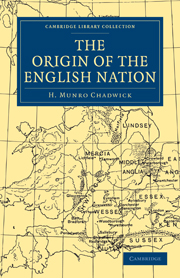Book contents
- Frontmatter
- PREFACE
- Contents
- CHAPTER I ENGLAND IN THE SIXTH CENTURY
- CHAPTER II THE WEST SAXON INVASION
- CHAPTER III THE INVASION OF KENT
- CHAPTER IV THE SAXONS, ANGLES AND JUTES IN BRITAIN
- CHAPTER V THE SAXONS, ANGLES AND JUTES ON THE CONTINENT
- CHAPTER VI THE KINGS OF ANGEL
- NOTE. THE EARLY KINGS OF THE DANES
- CHAPTER VII THE AGE OF NATIONAL MIGRATIONS
- CHAPTER VIII THE SAXONS AND ANGLES IN ROMAN TIMES
- CHAPTER IX THE CLASSIFICATION OF THE ANCIENT GERMANI
- CHAPTER X THE CULT OF NERTHUS
- CHAPTER XI KING AETHELWULF'S MYTHICAL ANCESTORS
- CHAPTER XII SOCIAL CONDITIONS OF THE ROMAN PERIOD
- ADDENDA
- INDEX
- Plate section
CHAPTER I - ENGLAND IN THE SIXTH CENTURY
Published online by Cambridge University Press: 07 September 2010
- Frontmatter
- PREFACE
- Contents
- CHAPTER I ENGLAND IN THE SIXTH CENTURY
- CHAPTER II THE WEST SAXON INVASION
- CHAPTER III THE INVASION OF KENT
- CHAPTER IV THE SAXONS, ANGLES AND JUTES IN BRITAIN
- CHAPTER V THE SAXONS, ANGLES AND JUTES ON THE CONTINENT
- CHAPTER VI THE KINGS OF ANGEL
- NOTE. THE EARLY KINGS OF THE DANES
- CHAPTER VII THE AGE OF NATIONAL MIGRATIONS
- CHAPTER VIII THE SAXONS AND ANGLES IN ROMAN TIMES
- CHAPTER IX THE CLASSIFICATION OF THE ANCIENT GERMANI
- CHAPTER X THE CULT OF NERTHUS
- CHAPTER XI KING AETHELWULF'S MYTHICAL ANCESTORS
- CHAPTER XII SOCIAL CONDITIONS OF THE ROMAN PERIOD
- ADDENDA
- INDEX
- Plate section
Summary
In the year 597 there arrived in this country a mission sent by Pope Gregory the Great for the evangelisation of the English people. Aethelberht the king of Kent, to whom they had made their way, quickly embraced the Christian faith and gave them a habitation in his capital, Canterbury.
It is with these events that our knowledge of English history begins. There can be little doubt that some kind of a register of important events began to be kept in one or other of the Kentish monasteries even during the lifetime of the missionaries; for there are a number of entries in both English and Continental chronicles which can hardly be explained otherwise. The establishment of bishoprics in other parts of the country led to the formation of similar records elsewhere. Consequently we are able, chiefly by means of Bede's collections, to construct a fairly connected history of most of the English kingdoms during the greater part of the seventh century.
When we turn to the sixth century however the case is very different. No contemporary records of that period have been preserved and it is more than probable that none such were ever kept. No doubt the remembrance of important events was long retained by oral tradition. But neither the missionaries nor their immediate successors for the most part seem to have cared to record these traditions. Except in the case of Wessex and Northumbria our knowledge of the sixth century is almost a blank. We do not even know how many kingdoms existed at this time.
- Type
- Chapter
- Information
- The Origin of the English Nation , pp. 1 - 18Publisher: Cambridge University PressPrint publication year: 2010First published in: 1924



